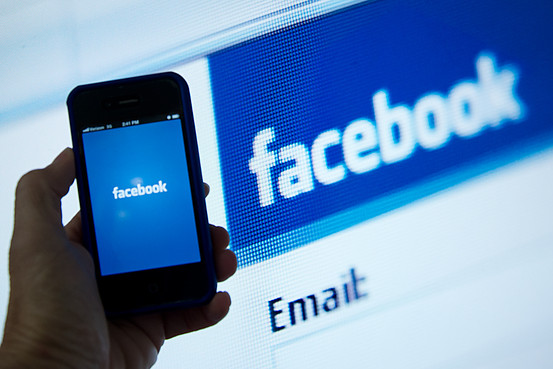By JOHN LETZING
Facebook Inc. acknowledged that it could have made a better effort to educate the social network's users about changes to the way email addresses are displayed with profiles.
Facebook users began to notice on Monday that the email address shown in their profiles had been switched to an @facebook.com address, and many started complaining. Apparent shortcomings in the company's communication of the changes appeared to aggravate what may otherwise have been a minor issue.
The company said users had been notified of the impending move. In April, the company announced it would start updating addresses "to make them consistent across our site." The announcement, however, failed to mention how the company planned to implement the change.
A Facebook spokeswoman said Tuesday that "in hindsight" the company probably should have better explained the email switchover. Asked if the move was made to bolster Facebook's own messaging and email presence, she said, "We want people to use whatever service is most effective for them," adding that the move was made to add consistency to the site once every user was assigned an @facebook.com address. The change also affected all Facebook employees, she said.
Still, Facebook's move spawned an array of angry online comments. Blog posts began to appear almost immediately after the email change was implemented, advising users how to undo it.
"Clearly, their notification leaves a lot to be desired," said Ray Valdes, an analyst at Gartner Inc. He said Facebook is likely banking on the notion that many users won't bother to reverse the change to their displayed email, thereby leaving a Facebook address in place.
"What Facebook is doing is basically trying to weave itself into the fabric of every users' online experience. They have a history of basically making changes to their services that bring users to the edge of their comfort zone—and sometimes beyond that," Mr. Valdes said.
Facebook has made clear that users can reverse the switch and restore their previously listed email as a default address. They also have the option of not publicly listing any email address at all.
The firestorm over a relatively minor change to user profiles illustrates the palpable influence of Facebook on its audience of more than 900 million users.
It also demonstrates the fine line Facebook must walk as a high-profile—and now public—company likely to absorb criticism as it updates its services and aims for an even broader sphere of influence on the Web.
Facebook first announced its internal messaging service, which involved distributing an @facebook.com email address to users, in late 2010. The Menlo Park, Calif., company touted its service as a more evolved form of email that could reduce clutter while focusing on messages sent among social contacts connected on the site.
But Facebook's initiative generally attracted scant attention from users mostly content to maintain their profiles on the site, while separately keeping their email services from providers such as Google Inc., Yahoo Inc. or Microsoft Corp.
According to the most recent available data from comScore, Microsoft's Hotmail was the most popular Internet-based email service globally as of May, with about 325 million unique visitors. Yahoo's service ranked second, with roughly 298 million users, while Google's Gmail garnered about 289 million users.
Those three services had ranked in the same order in the top three places in May 2011, according to the data.
Facebook's messaging initiative comes as the company seeks to bolster the impression that it is poised for significant financial growth, thanks to enduring interest from both advertisers and existing users.
Despite its popularity, Facebook isn't immune to occasional swings in user interest. ComScore reported last week that the site's number of unique visitors slipped to about 158.01 million in May, compared with 158.69 million in the prior month.
Write to John Letzing at john.letzing@dowjones.com
A version of this article appeared June 27, 2012, on page B4 in the U.S. edition of The Wall Street Journal, with the headline: Facebook Raises Hackles on Email.






![[image]](http://web.archive.org/web/20120627231902im_/http://si.wsj.net/public/resources/images/PJ-BI131_PTECHj_A_20120626195200.jpg)
![[image]](http://web.archive.org/web/20120627231902im_/http://si.wsj.net/public/resources/images/PJ-BI127_DSOLUT_A_20120626190007.jpg)
![[image]](http://web.archive.org/web/20120627231902im_/http://si.wsj.net/public/resources/images/OD-AS186_CDRIP_A_20120620114445.jpg)
![[image]](http://web.archive.org/web/20120627231902im_/http://si.wsj.net/public/resources/images/PJ-BH952_DSOLUT_A_20120619175442.jpg)



![[image]](http://web.archive.org/web/20120627231902im_/http://si.wsj.net/public/resources/images/OB-TN746_barcla_A_20120627090819.jpg)
![[image]](http://web.archive.org/web/20120627231902im_/http://si.wsj.net/public/resources/images/EI-BU094_EUSUMM_A_20120627143952.jpg)
![[image]](http://web.archive.org/web/20120627231902im_/http://si.wsj.net/public/resources/images/OB-TN868_0627it_A_20120627153204.jpg)
![[OB-TN958_0627eu_A_20120627175224.jpg]](http://web.archive.org/web/20120627231902im_/http://si.wsj.net/public/resources/images/OB-TN958_0627eu_A_20120627175224.jpg)
![[OB-TK448_0618sc_C_20120618103236.jpg]](http://web.archive.org/web/20120627231902im_/http://si.wsj.net/public/resources/images/OB-TK448_0618sc_C_20120618103236.jpg)
![[image]](http://web.archive.org/web/20120627231902im_/http://si.wsj.net/public/resources/images/OB-TN512_fruits_C_20120626171833.jpg)
![[image]](http://web.archive.org/web/20120627231902im_/http://si.wsj.net/public/resources/images/MK-BV268_AMAZON_C_20120626170823.jpg)
![[image]](http://web.archive.org/web/20120627231902im_/http://si.wsj.net/public/resources/images/P1-BG795_AMEROI_C_20120626170744.jpg)






Most Recommended
“If there is nothing to hide, the...;”
“Mr Harrop: With due respect, I...;”
“"but the TEA-Republicans ha...;”
“Ms Noonan...Apparently you have...;”
“"The Attorney General is...;”